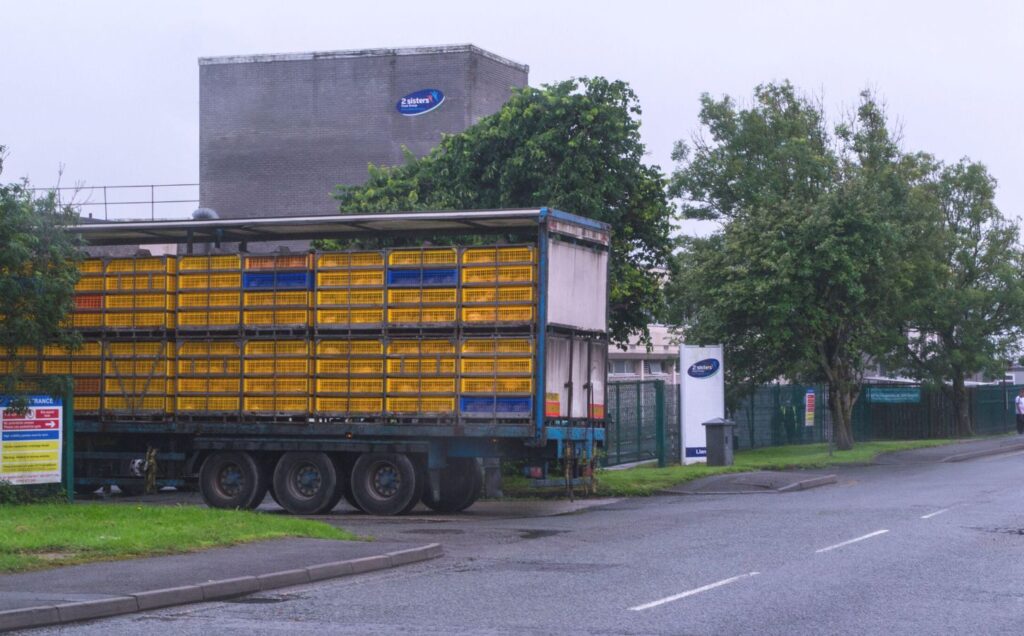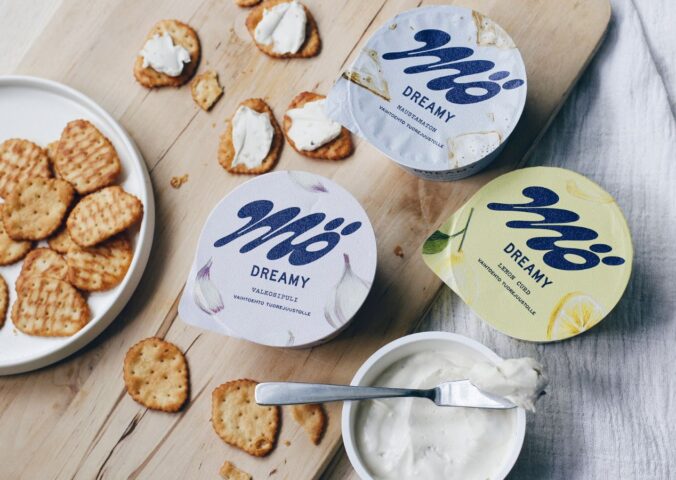Last month, 2 Sisters Food Group, one of the UK’s largest poultry producers, announced the planned closure of a factory in Llangefni, Wales. Each working day in the facility, tens of thousands of birds are killed, packed, and distributed.
The announcement created a stir in the local area, where over 700 staff are set to lose their jobs. Virginia Crosbie, the Member of Parliament for Ynys Môn (Anglesey) addressed the issue during Prime Minister’s Questions. The current UK Prime Minister, Rishi Sunak, responded by saying measures were in place to support communities affected by situations like this.
After delving into the history of the site, and expanding our gaze to encompass the wider picture, perhaps the closure was inevitable. And maybe even necessary. This factory represents a broken system, and a need to change.
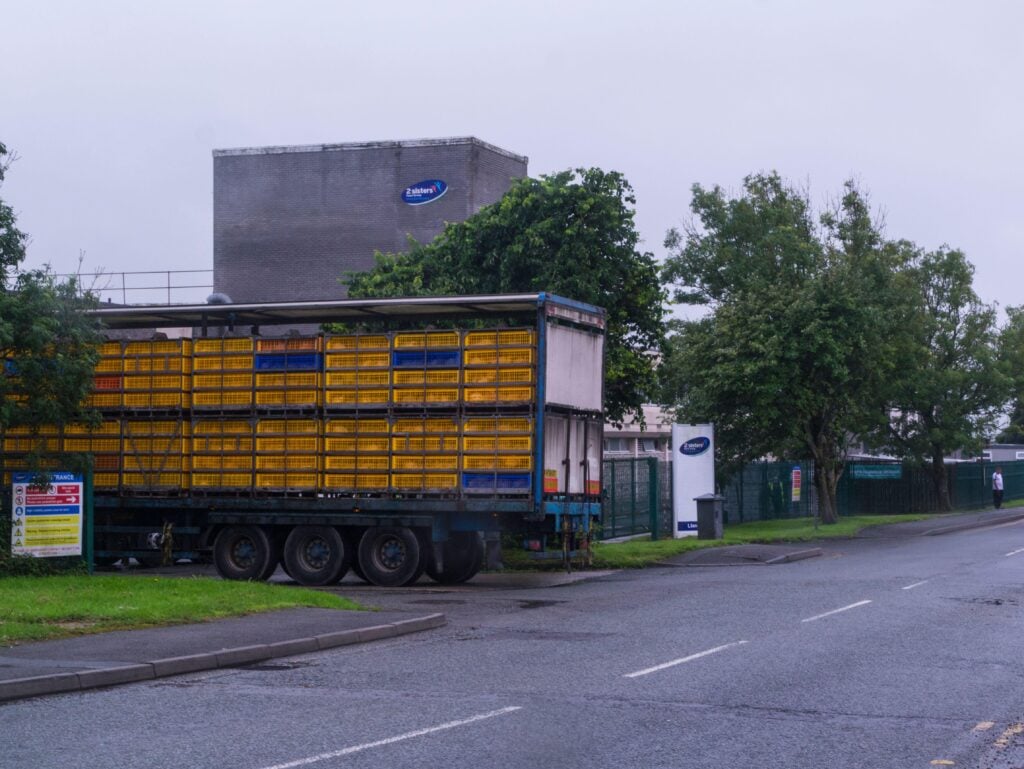
Background to the factory
Llangefni is the county town of Anglesey, an island off the coast of Wales. The 2 Sisters poultry factory is one of the largest employers in the area. Over the years, the facility has been the focus of a number of negative news stories. These have raised serious questions about the working practices, environmental impact, and systemic failures taking place, as well as the company and industry at large.
The problems began at Llangefni even before 2 Sisters took over the site from Dutch food company Vion 10 years ago.
Chicken farm pollution
In 2012, pollution in a protected nature reserve was traced back to a third party company using waste from the factory for muck spreading in nearby fields. Waterways supplying the surrounding wetlands of Cors Goch Nature Reserve became contaminated after the muck seeped into the groundwater. This followed a period of heavy rain, spoiling the delicate environment which happens to be a Site of Special Scientific Interest (SSSI) due to its unique ecosystem, and the rare flora and fauna which populate it.
Warden Jon Rowe described the incident as “quite serious.” He added that there was a possibility of localized extinction of invertebrates in the affected area, as well as damage to plant life.
Agriculture – specifically poultry farming in areas like the River Wye – was highlighted as a leading threat to waterways in a major report released in 2021. The report was produced by the RSPB, National Trust, Rivers Trust, Wildlife Trust, and Wales Environment Link
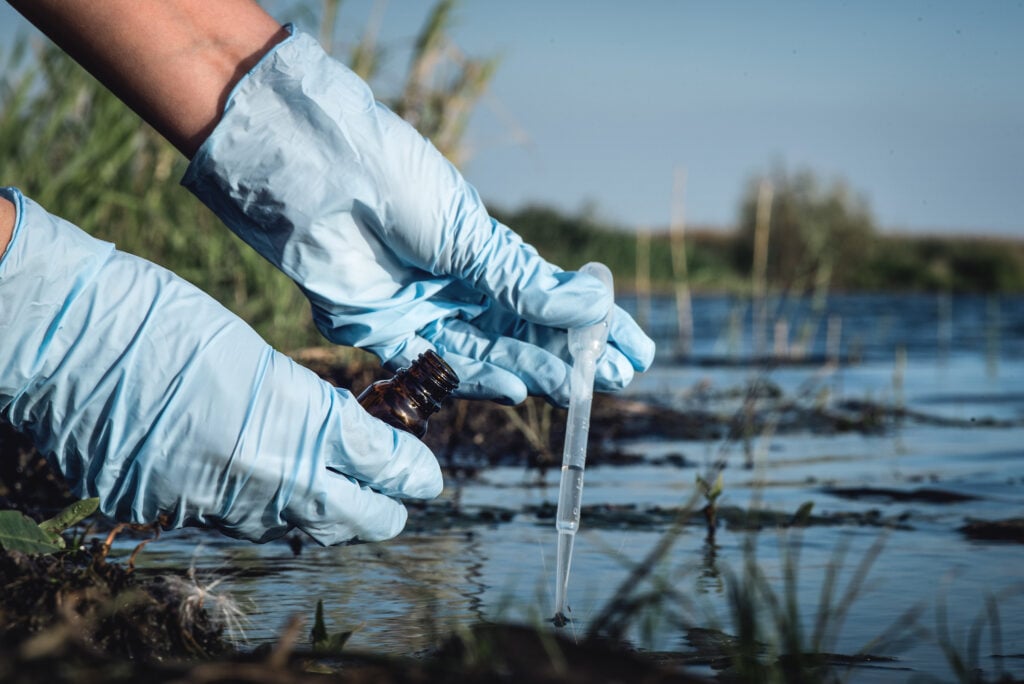
Also in 2012, an ammonia gas leak meant local residents were advised to stay indoors while emergency services and Environment Agency Wales sought to contain the leak. Between one to two tonnes of gas used in the facility’s cooling systems was reported to have been dispersed. Another ammonia leak in 2021 resulted in five workers being taken to hospital.
The effect on locals
Air quality seemed to have been a recurring issue for the residents of Llangefni. The smell wafting through the surrounding area raised numerous complaints.
In 2011, Vion was taken to court and fined £30,000 for two breaches of environmental regulations. This was due to an issue involving the blood tank and a “scrubber,” which is supposed to mitigate offensive odors. A worker at a nearby garage said the smell “was like rotting blood. The smell was awful, the worst I have ever smelt. It made me feel sick.” An Environment Agency officer sent to investigate said: “It made me feel sick and my eyes watered. It smelt like putrid rotting flesh, it made me retch.”
In 2013, Vion was forced to install odor control systems after local residents complained about the smell again. Between 2009-2013, around 300 complaints were lodged. This eventually triggered a review by the Environment Agency. It found that the odor came from a section of the factory in which feathers are removed from carcasses.
‘Smelt like something had died’
Ellen Parry, who worked nearby, said: “We couldn’t open the windows for some fresh air, we had to have fans on the desks and it was so bad we couldn’t concentrate on what we were doing. We’ve tried everything (to get rid of it) but failed. It smelt like something had died and I felt sorry for people walking on the street trying to get to the shops.” She’s right, of course. That smell was literally dead birds.
After 2 Sisters took over in 2013, the stench didn’t go away. A news report from 2019 centered on a proposed move of the local council registry office to the same industrial estate as the slaughterhouse, which would be where people got married. Councillor Non Parry complained, “Imagine someone’s wedding day, we all know about the smell that can arise from the abattoir. It can be terrible, how many times have we had to raise this issue over the years? It could ruin someone’s big day.”
Undercover investigations
Then, in 2014, the factory was thrust into the national spotlight as then UK Health Secretary, Jeremy Hunt publicly called for the Food and Standards Agency (FSA) to conduct an urgent review. This came after a five-month-long undercover investigation from the Guardian. The exposé alleged a multitude of major procedural failings at two 2 Sisters factories, including the Llangefni site.
What they found there was truly shocking. Mountains of chicken innards piled up around equipment and plucked feathers blanketing the floor were just the start. Investigators also documented dirty scalding tanks filled with contaminated water, all stemming from a reluctance to stop the production line to fix mechanical faults. If chicken carcasses were dropped on the factory floor they’d swiftly be thrown back on the conveyor belt.
The report highlighted another major problem with chicken production in general. A recent study by the FSA says that Campylobacter, a bacteria linked to chicken meat, is a leading cause of food poisoning in the developed world. There are more than 500,000 cases every year in the UK, with a relatively small number of deaths occurring. It thrives in exactly the type of unsanitary environment shown in the investigation, meaning the conditions in the factory posed a potential danger to public health.
Supermarkets crack down on the factory
Here’s where it gets interesting. Following the video, photographic, and testimonial evidence amassed by the Guardian report, it emerged that Tesco auditors paid a surprise early morning visit to the Llangefni site. They reportedly discovered “failings.” 2 Sisters denied any wrongdoing. The FSA then investigated, with an initial audit giving the factory a “generally satisfactory” rating.
However, communication with Labour MP, Huw Irranca-Davies, indicated the FSA then changed its stance, saying that a breach of hygiene had in fact taken place at both the Scunthorpe plant (also part of the Guardian’s original investigation, also initially been cleared of wrongdoing by the FSA), and in Llangefni. Additionally, it’s been reported that the FSA only tested for salmonella, not Campylobacter, during its audit.
Subsequent anonymized tests by the FSA over twelve months revealed that up to 80 percent of chickens in UK supermarkets were infected with campylobacter. This is one fact that Tim Smith, the Group Quality Director of Tesco and ex-chief executive of the FSA, seemed keen to suppress. They reportedly lobbied the government in order to prevent a food scare which could impact the industry. Pressure was even put on the FSA itself not to release the results of the tests.
The FSA’s then-chief executive, Catherine Brown told the Guardian: “It is disappointing that the British Retail Consortium, which speaks on behalf of retailers, has written to us again pressing us not to release the results of the retail survey and seeking to call in to question the validity of the sampling plan, which they were consulted about before the survey commenced.”
‘Not a one off’
In 2017, after another explosive joint investigation by the Guardian and ITV at a 2 Sisters site in West Bromwich, a government select committee report concluded that the problems highlighted were “not a one off.” And, that “the past record of 2 Sisters Food Group is far from pristine.” The findings also criticized the FSA itself for failing to find what only undercover investigators seemed to.
Further issues continued to appear in Llangefni. In 2020, more than 200 workers were infected with Covid-19, forcing 2 Sisters to close the factory for two weeks. During the pandemic, meat processing plants and abattoirs became contagion hotspots due to conditions inside the buildings being favorable for the virus to spread. Socioeconomic factors which contributed to this global trend included low-paid workers fearing a loss in pay by staying home, long hours, and highly staffed working areas. The lack of adherence to hygiene rules could only increase the risk.
Pandemic risk
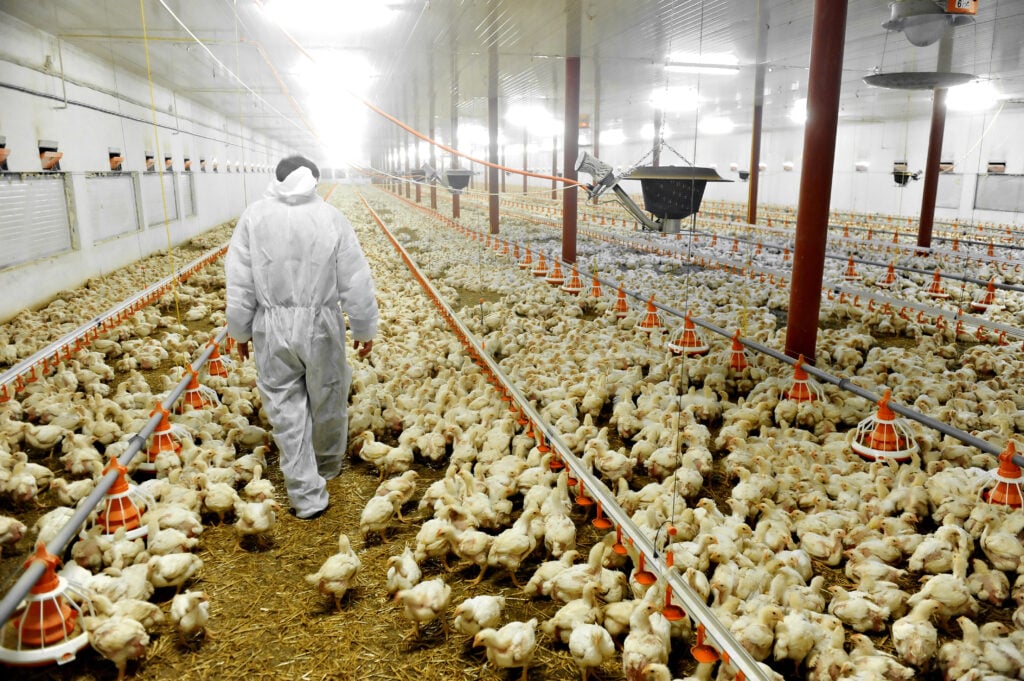
This is important because right now, another virus is currently ravaging the poultry industry. It is already resulting in mass casualties, and financial difficulties for companies. The highly pathogenic avian influenza (HPAI) H5N1, or bird flu, is currently spreading across the world, and has been detected in Anglesey.
The majority of lives lost due to H5N1 relate to the birds themselves. Forty-eight million birds were culled in the UK and EU in the last year, and the spread continues with wild bird populations also being devastated. But that’s not the only danger.
Can humans get bird flu?
Human infections across the world are extremely rare. They do occasionally happen, but mostly among people with very close contact with birds. The World Health Organisation (WHO) reported a human mortality rate of 56 percent. For context, the estimated global mortality rate of Covid-19 is around 3.4 percent.
Bird flu isn’t currently known to be transmissible between humans. Concerns were raised in October 2022 when a new variant of the virus began to spread between minks at a farm in Spain. This was reportedly the first time mammal-to-mammal transmission had been recorded. More than 50,000 mink were culled due to the findings.
The variant has also been known to infect foxes, cats, dolphins, seals, bears, and ferrets. If we continue farming non-human animals intensively, there is certainly the potential for a new mutation to emerge which could be highly transmissible between humans. It’s not hard to imagine workers at a poultry factory or a farm, surrounded by tens of thousands of birds, being the first to fall victim.
Financial losses
It seems 2 Sisters is struggling to find workers, anyway. The disastrous effects of a hard Brexit on the ability to employ, and exploit, migrant workers to keep labor costs low is a thorn in the side of big business. The same is true for the current mass shortage of NHS workers, fruit and veg pickers, and truck drivers. In 2022, 2 Sisters reported £95.5 million in annual losses, up from £34.3 million the previous year.
A number of factors suggest companies like 2 Sisters frequently ignore the rules. For example, inconsistencies in auditing, the ability for certain facilities to opt out of unannounced audits, and a lack of communication between retailers, standards authorities, and government. Plus, an almost non-existent system of implementing significant penalties, and the ever-present obsession with financial maximization in a capitalist economy. As with all sectors within animal agriculture, the lives of the individual animals are reduced to a number on a balance sheet. And success is measured in a cold death:cost ratio.
The problems with animal agriculture
This story is important because it weaves together many detrimental aspects of animal agriculture at a local level. We can see patterns emerging, and those same patterns are replicated all over the country – and the world.
2 Sisters says it will shift production to more efficient sites. The umbrella companies will find new ways to pivot, and profit. The executives will carry on moving between high-paying jobs that enable the system. After the scandal in West Bromwich, Ranjit Singh Boparan (the founder of 2 Sisters) stepped down as chief executive of the company, only to take a position as the president of the 2 Sisters Holding company, Boparan Holdings.
Ronald Kers, former CEO of Müller, one of the world’s biggest dairy companies, took over at 2 Sisters. The current board of 2 Sisters is filled with figures plucked from key roles at major supermarkets. Tim Smith moved from Tesco to a leading role at Cranswick, another major food producer heavily involved in animal products. And in 2022, Smith was appointed new industry chair of the Food and Drink Sector Council by the UK government.
The problem continues
Billions of chickens will still be killed, just in different buildings. The community there will have to find work amidst one of the toughest economic climates ever to face the country in modern times. We’re left with a vacant industrial structure and fewer local job opportunities. Plus, the continuation of an industry with a legacy of violence, environmental damage, and exploitation, and which has the potential to unleash an even deadlier pandemic.
There is another way of course. Instead of forcibly breeding billions of birds into existence just to profit from their slaughter, we could work towards a plant-based future. A shift to a vegan diet has the potential to reduce our personal carbon footprint by 73 percent. Additionally, a global move in that direction could free up 75 percent of agricultural land. This would open up space to rewild, draw down carbon, increase biodiversity, reduce the risk of pandemics, and strengthen our ability to avoid the worst effects of the climate crisis.
The Plant Based Treaty is being endorsed by authorities around the world, with Edinburgh being the first capital city in Europe to join the grassroots initiative. A green industrial revolution has the potential to create transferable, as well as entirely new, jobs. And in the process, boost the economy and improve our living spaces. We have the technology, the expertise, and the intelligence to achieve great things. We just need the will to take action.
